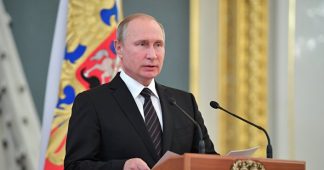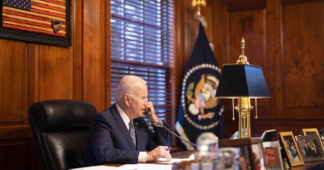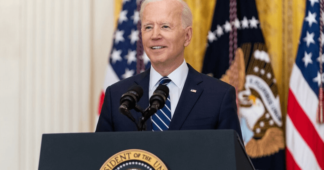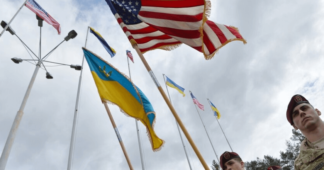Posted on
Take heart, most of you who fear war rather than profit from it. You would not know it amid the gloom and doom about “another Russian invasion” of Ukraine, but diplomacy – not war – is about to break out this month.
As senior U.S. and Russian negotiators begin talks early next week in Geneva, the makings of a first-step-in-the-right-direction deal are already at hand. And for this we can thank Presidents Joe Biden and Vladimir Putin for serious, attentive, one-to-one conversations in the past several weeks.
You don’t need a degree in Kremlinology or tea leaves to understand how this came about and what led to the Biden-Putin talks: in one key respect the second (Dec. 7, virtual) was a carbon copy of the first (June 16 in Geneva).
Both came at Biden’s initiative, after Russia moved tens of thousands of troops near the border with Ukraine ready to stave off, or respond to, Ukrainian government threats to take back the Donbass and Crimea. By April 2021, things had come to a head, culminating in President Biden’s strange call to President Putin on April 13. (It is a safe guess that it was Putin who called first and left a “voicemail” saying: “Your unleashed Ukrainians and the American crazies abetting them are playing with fire; please call me – and quickly“).
During their conversation on April 13, Biden – out of the blue – called for a summit meeting with Putin. At the same time, Biden promptly ordered two warships on their way into the Black Sea to turn around and instead visit Greece; and Kiev was told to cool its rhetoric. On April 22, Russian Defense Minister Sergey Shoigu announced that the large military exercises near Ukraine had been completed, the objectives “fully achieved”, and that the troops would return to their bases by May 1. (For more on this, see:
Ukraine Redux
This past autumn, amid similar circumstances the Russians considered provocative, Moscow put its signature “asymmetrical” military muscle again on display, as Russian troops again converged in areas near Ukraine. Another summit was deemed to be in order, so a remote conversation between the two presidents was arranged for Dec. 7, at which Putin apparently gave Biden an earful, complaining not only about Ukraine but about NATO armed encroachment right up to Russia’s borders – and, especially the planned emplacement of offensive missiles that would eventually threaten Russia’s ICBM force.
Given his known preference for personal negotiations, President Biden apparently suggested appointing negotiators to immediately work on these issues. I imagine he was surprised to have to deal at once with two draft agreements the Russians had prepared for such talks.
On Dec. 25, the Russians announced a pullout of over 10,000 troops from near the border with Ukraine. The announcement fell like the proverbial tree in the forest with no one around to hear. Might someone interpret it as a gesture to help get U.S.-Russia talks off on the right foot in January? By now it is clear that none of the usual suspects in the corporate media will hazard such a guess without an OK from Washington. (See: “Media Still At Sea Without Official ‘Guidance’ on Russians Leaving Areas near Ukraine“).
Better to keep ringing changes on the main theme – the likelihood of “another” Russian “invasion” of Ukraine. Not to mention the awkward reality that, with Russian troops going the wrong way, Washington’s PR specialists would face a formidable challenge, were they to spin this as more evidence of Russian hostile intent. Far better to ignore the troop withdrawal and await further guidance from Washington.
A Makings of a Deal?
President Putin has made no secret of his strong opposition to using what have been labeled “ABM sites” being installed in Poland and Romania into sites for offensive missiles that eventually would endanger Russia’s ICBM force.
Both Washington and Moscow have been tightlipped about why Putin wanted to talk to Biden again less than two weeks before U.S.-Russia talks start in Geneva. It is a safe guess that Putin wanted to get a commitment from Biden not to put similar “ABM sites” in Ukraine.
The official Russian account of the Dec. 30 Biden-Putin telephone call includes a passage which is absent from the much shorter White House account, and which also went unmentioned during the press briefing conducted by a “senior administration official” – apparently national security adviser Jake Sullivan):
“It was confirmed that the negotiations would take place first in Geneva on January 9–10. … The presidents agreed to personally supervise the negotiating tracks, especially bilateral, with a focus on reaching results quickly. In this context, Joseph Biden emphasized that Russia and the US shared a special responsibility for ensuring stability in Europe and the whole world and that Washington had no intention of deploying offensive strike weapons in Ukraine.” [Emphasis added.]
Assuming the White House does not disavow that Biden made this undertaking, the step can be seen as a significant quid from the U.S. side. The quo can be quick in coming if Defense Minister Shoigu is told to announce the next withdrawal of Russian troops from areas near Ukraine – and get someone in the Establishment media to report it this time.
For a more comprehensive treatment of what’s at stake in the upcoming U.S.-Russia talks, I could not recommend more highly Ted Snider’s “SixThings the Media Won’t Tell You About Ukraine,” if you missed it yesterday.
Ray McGovern works with Tell the Word, a publishing arm of the ecumenical Church of the Saviour in inner-city Washington. His 27-year career as a CIA analyst includes serving as Chief of the Soviet Foreign Policy Branch and preparer/briefer of the President’s Daily Brief. He is co-founder of Veteran Intelligence Professionals for Sanity (VIPS).
Published at original.antiwar.com
We remind our readers that publication of articles on our site does not mean that we agree with what is written. Our policy is to publish anything which we consider of interest, so as to assist our readers in forming their opinions. Sometimes we even publish articles with which we totally disagree, since we believe it is important for our readers to be informed on as wide a spectrum of views as possible.











